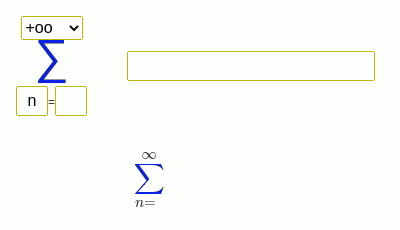Sum of series (2*i+1)/n^2
The solution
You have entered
[src]
oo ____ \ ` \ 2*I + 1 \ ------- / 2 / n /___, n = 1
$$\sum_{n=1}^{\infty} \frac{1 + 2 i}{n^{2}}$$
Sum((2*i + 1)/n^2, (n, 1, oo))
The radius of convergence of the power series
Given number:
$$\frac{1 + 2 i}{n^{2}}$$
It is a series of species
$$a_{n} \left(c x - x_{0}\right)^{d n}$$
- power series.
The radius of convergence of a power series can be calculated by the formula:
$$R^{d} = \frac{x_{0} + \lim_{n \to \infty} \left|{\frac{a_{n}}{a_{n + 1}}}\right|}{c}$$
In this case
$$a_{n} = \frac{1 + 2 i}{n^{2}}$$
and
$$x_{0} = 0$$
,
$$d = 0$$
,
$$c = 1$$
then
$$1 = \lim_{n \to \infty}\left(\frac{\left(n + 1\right)^{2}}{n^{2}}\right)$$
Let's take the limit
we find
$$\frac{1 + 2 i}{n^{2}}$$
It is a series of species
$$a_{n} \left(c x - x_{0}\right)^{d n}$$
- power series.
The radius of convergence of a power series can be calculated by the formula:
$$R^{d} = \frac{x_{0} + \lim_{n \to \infty} \left|{\frac{a_{n}}{a_{n + 1}}}\right|}{c}$$
In this case
$$a_{n} = \frac{1 + 2 i}{n^{2}}$$
and
$$x_{0} = 0$$
,
$$d = 0$$
,
$$c = 1$$
then
$$1 = \lim_{n \to \infty}\left(\frac{\left(n + 1\right)^{2}}{n^{2}}\right)$$
Let's take the limit
we find
True
False
The answer
[src]
2 2 pi I*pi --- + ----- 6 3
$$\frac{\pi^{2}}{6} + \frac{i \pi^{2}}{3}$$
pi^2/6 + i*pi^2/3
Numerical answer
[src]
1.64493406684822643647241516665 + 3.28986813369645287294483033329*i
1.64493406684822643647241516665 + 3.28986813369645287294483033329*i

Examples of finding the sum of a series
- The Sum of the Power Series
x^n/n
(x-1)^n
- Factorial
1/2^(n!)
n^2/n!
x^n/n!
k!/(n!*(n+k)!)
- Flint Hills Series
csc(n)^2/n^3
- Basel problem
1/n^2
1/n^4
1/n^6
- Harmonic series
1/n
- Grandi's series
(-1)^n
- Alternating series
(-1)^(n + 1)/n
(n + 2)*(-1)^(n - 1)
(3*n - 1)/(-5)^n
(-1)^(n - 1)*n/(6*n - 5)
- Newton–Mercator series
(-1)^(n + 1)/n*x^n
- Exam the series for convergence
(3*n - 1)/(-5)^n

 2^n/(n+1)
2^n/(n+1)
 sin(8/9^(n+1))*cos(10/9^(n+1))
sin(8/9^(n+1))*cos(10/9^(n+1))
 ln(n+2)
ln(n+2)